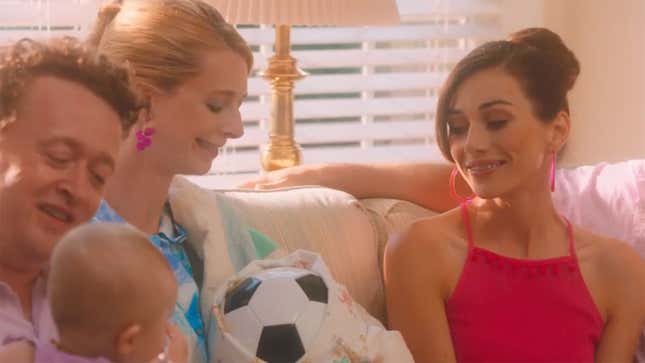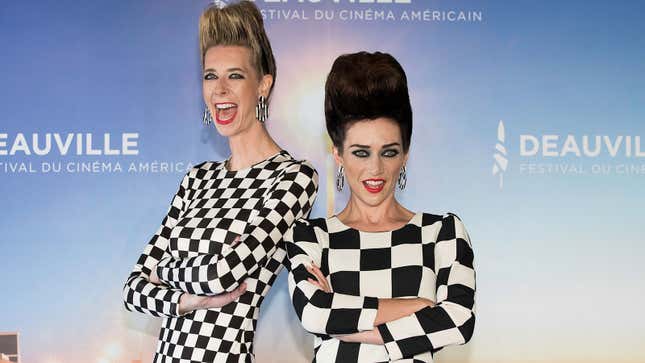Greener Grass Is the Absurdist Soccer-Mom Melodramedy of Your Nightmares
Entertainment
Image: Array
The film Greener Grass starts with one suburban housewife giving her baby to another out of politeness, and it only gets weirder from there. The brainchild of Jocelyn DeBoer and Dawn Luebbe, who met years ago in their New York Upright Citizen’s Brigade sketch group (they’ve both since relocated to Los Angeles), Greener Grass is a miracle of audacity. DeBoer and Luebbe wrote, directed, and star in this satire of white passive-aggression that takes place in a pastel neighborhood whose residents drive only golf carts, wear braces, and speak to each other on a narcotic delay. It is in no hurry to make sense, a self-assured vision of cinema and comedy that’s as arty as it is culty. In 2019, this is a rare thing indeed.
“Our movie has all the makings of possibly being something awful,” said DeBoer on Thursday in an interview with Jezebel. That is the risk she and Luebbe had to take for a movie that owes as much to John Waters and David Lynch as it does the societal pressure for women to apologize and keep apologizing. They based the movie on a short film they made in 2015 and shot it last year over 19 days in the Atlanta suburb Peachtree City, Georgia. They executed their vision with perfectionist hands; DeBoer said they went through 21 page-one rewrites while attempting to nail the tone. “Everything is so important to us. Like, if a napkin is wrong, it hurts inside,” she said, illustrating their strong aesthetic sensibility (while sounding like a character in her movie).
The power dynamic of their characters—Luebbe’s Lisa is alpha to DeBoer’s Jill’s beta—they say is not reflected in their own collaboration. “I like to think our relationship is slightly less dramatic,” says Luebbe. We discussed their movie and its ideas, Mating in Captivity, and their specific send-up of white women in the United States. An edited transcript of our discussion is below.
JEZEBEL: I’m astounded that you got something so off the wall made.
JOCELYN DEBOER: We’re astounded too. We’re so lucky. Our movie is a low-budget indie, but with the funding that we had, we had complete creative control. We feel like that’s the only reason a movie like this could exist.
How did you conceive this movie? Did you start out with ideas about suburbia and womanhood in America, or did you say, “Let’s make a fucked-up movie,” and then figure out how to do it?
DAWN LUEBBE: The original idea started out as a short film we made in 2015 that was on the festival circuit in 2016. The idea for the short came about very quickly. We were like, “What can we shoot quick and easy where we’re both in a backyard?” It ended up being a bit more complicated, but I think in general, the nugget of what we were always interested in exploring was the drama of the mundane.
DeBoer: Politeness taken to the extreme. We’re both from the Midwest and both of our families and our upbringing were full of people who were so, so nice and just always trying to make everyone around them comfortable. Tall poppy syndrome’s a very real thing. When we moved to New York, and especially L.A., you meet people who are just direct, so into self-promotion, and self-expression in ways that we just weren’t used to. I think that’s where the satire comes from, kind of, just recognizing those differences in culture and being interested in, “Is it right that it’s not right to talk about yourself ever?” Questioning all the things we grew up thinking.
-

-

-

-

-

-

-

-

-

-

-

-

-

-

-

-

-

-

-

-

-

-

-

-

-

-

-

-

-

-

-

-

-

-

-

-

-

-

-

-









































